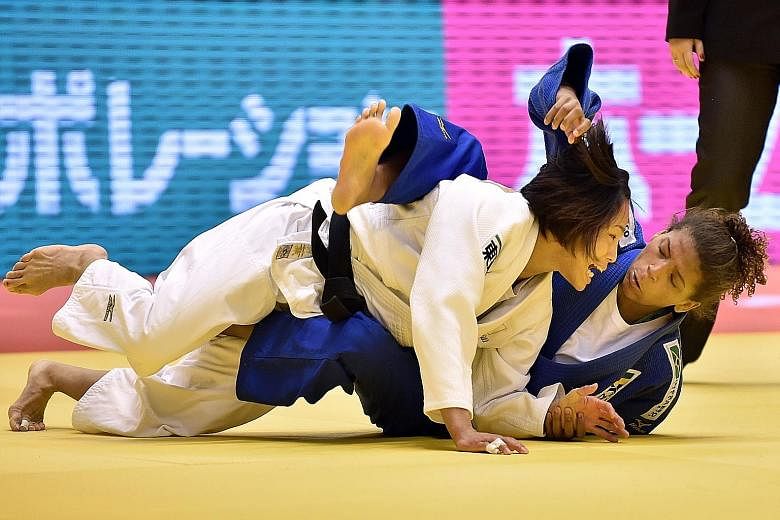RIO DE JANEIRO • On a narrow, steep street less than 10km from where the Olympic judo competition will take place in August, near a pile of unused bricks alongside Rua Agostinho Gama, 31 concrete steps hugged the outside of a building, rose and turned out of sight.
The stairs had no railing, and rebar stuck out several feet in a few places. Like so much of this dichotomous city, away from the beaches and into the hills and into the slums, things seemed both under construction and crumbling.
A rooster in a cage sat at the landing at the top, and through the door where Rafaela Silva grew up and her family still lives, she shared a chair with her older sister, Raquel.
Few Brazilian athletes will be watched at the Rio Olympics as intensely as Rafaela Silva, the 2013 world champion in judo. Brazil has never won more than five gold medals at a single Olympics, but no sport has produced more Brazilian medallists than judo.
The 23-year-old, who competes in the 57kg class, is expected to add another.
"The only medal I don't have is an Olympic medal," she said. "To have a chance to win one in front of my family and friends is priceless."
The floor of the home was cluttered with laundry - mostly judogis, the heavy canvas judo uniforms - and the walls were covered in judo awards.
Raquel Silva, 26, is an international judo champion on Brazil's national team too, but she fell short of qualifying for the Olympics.
She was once expelled for fighting in school.
Rafaela frequently fought the neighbourhood boys in the street. Three years apart, they sometimes attended different schools.
"We would meet to walk home together, and I would come around the corner, and Rafaela was already in a fight," Raquel said.
Their parents helped steer the girls through the temptations. A nearby judo gym was one way. It provided structure and diversion.
The inside of Rafaela's right biceps, hidden under her judogi during competitions, is tattooed with the Olympic rings and a note, in Portuguese: "God knows how much I've suffered and what I've done to get here."
A bit earlier and a few kilometres away, the Silvas' long-time coach, Geraldo Bernardes, described Rafaela's journey from the slums to the Olympics.
Bernardes is a former coach of the national team. One former pupil is Flavio Canto, a two-time Olympian who won a bronze medal at the 2004 Athens Games and is now a celebrity in Brazil.
In 2003, Canto started Instituto Reacao (Reaction Institute), a judo school for all ages and abilities, in Rocinha, Rio's largest favela.
He joined forces with Bernardes, who had his own gyms, including one in Cidade de Deus.
They have expanded Instituto Reacao into a programme with five gyms and 1,250 athletes, including 130 in its "Olympic" programme, which Bernardes oversees.
More than a decade ago, his pupils included the young, feisty Silva sisters. He immediately saw potential in them.
He told the girls that he would not give them belt exams if they got into trouble at school or on the streets - enough of an incentive to keep them out of most trouble. He helped pay for the girls' training, including travel to tournaments that the family could not afford.
Rafaela earned her black belt at 16 and became a junior world champion. At 19, she won silver at the world championships. At 21, she won gold. But the tournament that haunts her was in between, at the 2012 London Olympics.
Then, as now, she was considered a serious medal contender. But she was disqualified during a preliminary match for an illegal hold, a technicality related to a recent rule change.
"The opponent was a girl from Hungary whom I had beaten easily before," Rafaela said.
"I don't know if I thought that I should just do this quickly, but the judge gave me one point, then changed it and disqualified me."
The loss still burns.
"I trained four years for the Olympics, and now in a minute they were gone," she said.
The immediate aftermath was worse. Some Brazilians on social media mocked her and called her racial epithets, one saying that "the place of a monkey is in a cage".
Rafaela could not resist responding, and did so with vitriolic name-calling of her own. The Twitter war attracted so much attention that the Brazil Olympic Committee stepped in to admonish the attacks, and judo officials persuaded her to stop replying to bigoted critics.
Nearly four years later, she does not regret her actions. "Not at all," she said.
The episode nearly made her quit. She had overcome many obstacles to become one of the world's best, but the closest she came to quitting was after the London Games, Bernardes said.
Rafaela took a few months off. Her family worried for her.
"Rafaela got depressed," Raquel said.
"She watched television all day and cried alone in front of the TV. Our mother cooked her favourite things to cheer her up, but that didn't work."
Bernardes wanted Rafaela to come to the institute, to resume training and rebuild the fire.
When she finally came, she chanced upon a presentation by a sports psychologist.
Intrigued and inspired, she resumed her physical training and added mental training, too.
The next spring, her focus back and her frustration funnelled, she became a world champion.
And now the Olympics have come again, this time to her, just a few kilometres from home.
Bernardes will coach her at the institute. Her sister, a weight class below, will spar with her. Her parents are hoping to get tickets to her matches. A nation will watch, expecting a result to celebrate.
And a neighbourhood will cheer her on, to see if a young woman from the crumbling, chaotic streets in the hills can construct one of the unlikeliest Olympic stories for the home team.
NEW YORK TIMES

